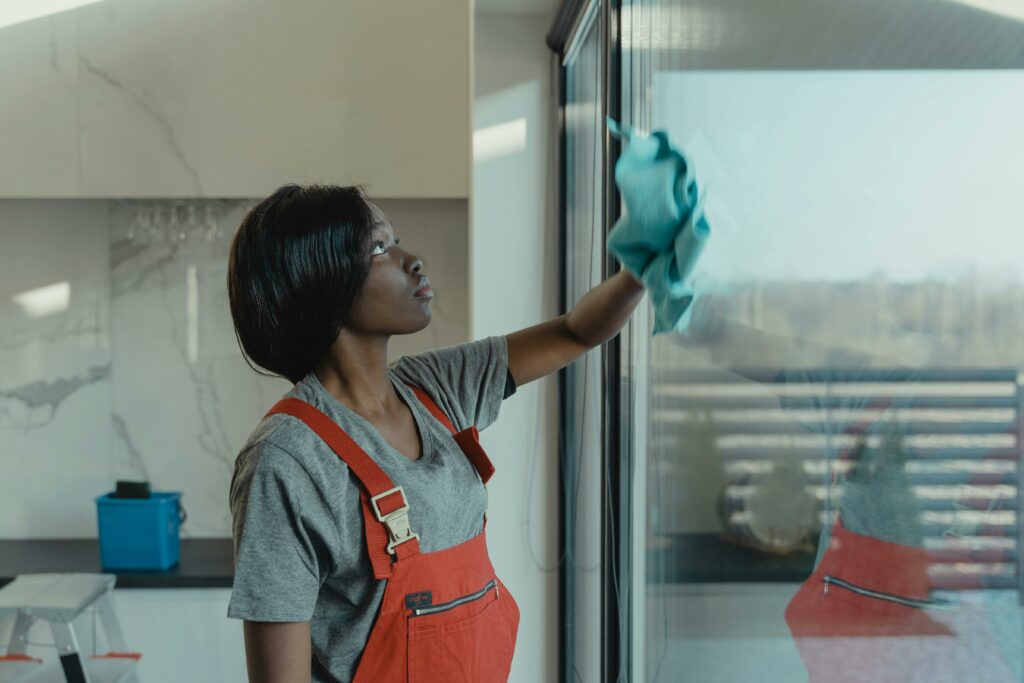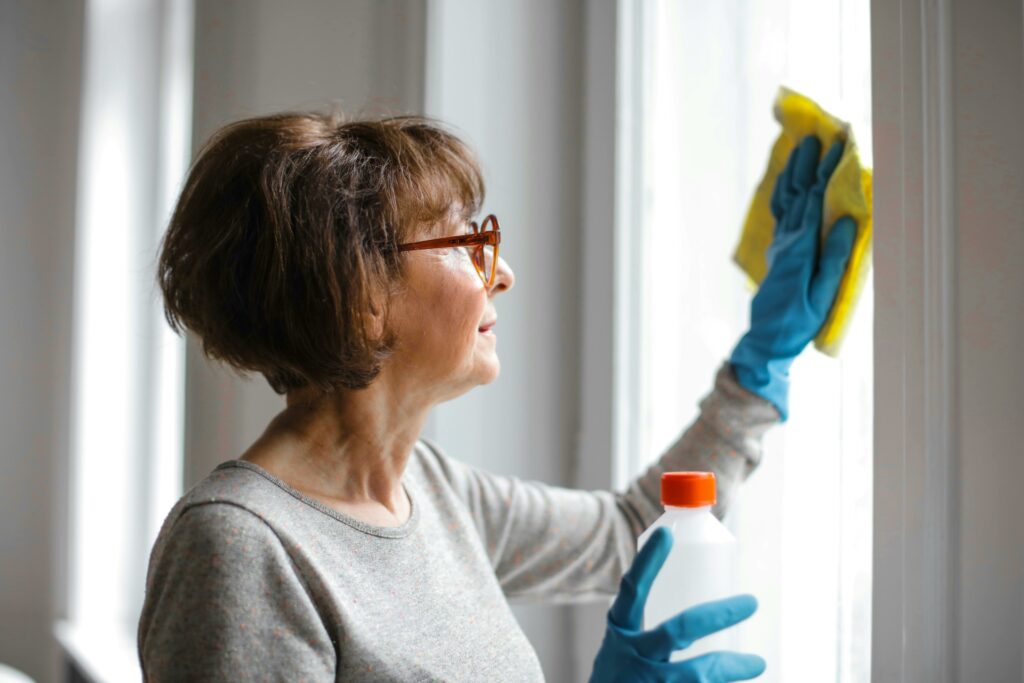Vinegar is often hailed as a miracle solution for household cleaning — from deodorizing kitchens to removing stubborn stains. But when it comes to your windows, is it really a good idea to clean a window with vinegar? On the surface, it sounds like a smart, budget-friendly DIY trick. However, the truth is more nuanced. While vinegar does have some glass-cleaning properties, it’s not always the best or safest option — especially for large or exterior windows.
In this article, we’ll walk you through how people typically use vinegar to clean windows, why it’s not always ideal, and when it’s best to bring in professional help.
What You’ll Learn in This Guide
- How vinegar-based window cleaning works
- Common DIY recipes and how people use them
- Hidden downsides and limitations of vinegar
- What professionals do differently
- Situations where vinegar may damage your windows
- Smarter alternatives for a streak-free shine
- When it’s time to call in the experts
The Basics of Cleaning Windows With Vinegar
The typical DIY method for window clean with vinegar starts with a basic homemade solution: distilled white vinegar mixed with water. Some people even add a few drops of dish soap for grease-cutting power.
Common DIY Recipe:
- 1 part white vinegar
- 1 part warm water
- Optional: a drop or two of dish soap
This mixture is poured into a spray bottle and applied directly to the glass. The cleaner is then wiped off with a microfiber cloth, newspaper, or paper towels — depending on preference.
The appeal is obvious: vinegar is cheap, widely available, and free from strong chemicals. It cuts through basic grime, especially kitchen film and hard water stains.
But just because it’s popular doesn’t mean it’s the best or safest choice for all situations.
One Size Doesn’t Fit All: Why Vinegar Has Limits
The phrase “natural doesn’t always mean better” applies here. While vinegar is often praised for its non-toxic profile and affordability, its effectiveness as a window-cleaning agent comes with caveats. It’s helpful for light, everyday messes — but falls short in many common real-world situations.
Here’s What Vinegar Doesn’t Do Well:
- Struggles With Heavy Buildup: Vinegar’s acidic nature can help dissolve mild hard water stains or smudges, but it lacks the strength to tackle thick grime, caked-on debris, sap, or bird droppings — especially on exterior windows exposed to the elements. In these cases, vinegar simply doesn’t penetrate enough to lift the residue, leaving the glass cloudy or streaked.
- Doesn’t Disinfect: Despite its strong smell, vinegar is not a registered disinfectant. It doesn’t kill many common bacteria or viruses that can accumulate on frequently touched windows — especially those around doors, kitchens, or public-facing areas. If you’re aiming for a sanitized surface, vinegar alone won’t cut it.
- Can Damage Seals and Frames: Over time, the acetic acid in vinegar can slowly wear away at rubber seals, strip the finish from painted frames, or corrode aluminum and other metals. Repeated exposure — even from light cleaning — can shorten the life of your window assembly, especially if the solution isn’t properly rinsed off.
- Often Leaves Streaks or Haze: This is one of the most common complaints. Vinegar may evaporate quickly, but without the right application method or cloth (such as a lint-free microfiber towel), it leaves streaks and residue behind — particularly when cleaning in sunlight, which speeds up drying before the grime is fully removed.
- Lacks Lubrication for Squeegees: If you’re using a squeegee to clean your windows (like professionals do), vinegar doesn’t provide the right glide or consistency that soap-based cleaners offer. It can drag or leave water trails behind, requiring extra passes and more effort.
- Not Ideal for Specialty Glass: Vinegar shouldn’t be used on tempered glass, frosted panes, mirrors with protective coatings, or any glass with UV-blocking film. It can degrade these features or leave permanent etching over time.
Using vinegar to clean window glass might seem like a harmless home remedy, but its limitations become obvious on large projects, exterior surfaces, or specialty windows. While it’s fine in small doses for interior cleaning, it’s far from a one-size-fits-all solution — and in many cases, it can do more harm than good.

A Deeper Look: Is It Safe for All Types of Glass?
Not all windows are created equal. Many homeowners don’t realize their windows may have coatings, films, or tints that can react negatively to vinegar.
Vinegar May Damage:
- Tinted glass
- Double-pane windows with failed seals
- Wood frames or unfinished sills
- Older glass with micro-pitting
If your windows are newer and have UV protection or special coatings, using vinegar could reduce their longevity or void a warranty. It’s always safer to stick to approved cleaners or let a professional assess your windows’ condition.
What Professional Cleaners Do Differently
When you hire a professional window cleaning service, you’re not just paying for someone to wipe down glass — you’re investing in specialized training, commercial-grade equipment, and proven techniques that deliver longer-lasting, damage-free results. Professionals know how to approach every type of window material, layout, and buildup scenario with precision.
Here’s what sets professional cleaning apart:
- Pure Water Systems for a Spotless Finish: Instead of using tap water, professionals rely on deionized or reverse osmosis-purified water that’s completely free of minerals and impurities. This ultra-pure water attracts and lifts dirt from the glass without needing soap — and it dries without leaving any streaks, spots, or residue. It’s especially ideal for exterior windows and multi-story properties.
- Advanced Squeegee Techniques: Window cleaning experts don’t just swipe randomly with a rag. They use professional-grade squeegees with the right rubber hardness and edge angle for each surface. Their methodical, overlapping passes eliminate drips, avoid streaks, and leave windows crystal clear in far fewer strokes than a DIY approach.
- Safe Access to Hard-to-Reach Windows: Second- and third-story windows, skylights, or windows above sloped landscaping require proper safety training and tools. Professionals use OSHA-compliant ladders, stabilizers, and often harness systems or extension poles. They’re trained to work at height without damaging siding, gutters, or landscaping.
- Careful Framing and Screen Handling: Window frames, screens, sills, and seals all need different cleaning methods than the glass itself. Pros know how to clean these elements without causing discoloration, streaking, or accidental damage. They also inspect for signs of wear or leakage — something most homeowners miss.
- Time Efficiency with Better Results: What could take a homeowner an entire Saturday can usually be completed by professionals in a fraction of the time — and with better results. They arrive with the right tools, perform a consistent process, and ensure every corner is clean, even in tight spaces or behind tricky obstructions.
- Streak-Free in All Conditions: Whether it’s a sunny day or cloudy and damp, professionals adjust their method and materials to the environment. They know how to clean windows during different weather conditions without leaving water marks, film, or haze.
- Knowledge of Specialty Glass: From energy-efficient low-E glass to decorative leaded windows, pros know which cleaning agents and tools are safe — preventing costly damage to finishes or coatings that DIY cleaners might unknowingly cause.
For a trusted, hassle-free solution, check out Window cleaning in Grand Rapids to see how experienced local pros handle even the toughest jobs — safely, quickly, and with long-lasting clarity.
When Vinegar Actually Makes Things Worse
Using vinegar the wrong way can cause more harm than good, especially in these scenarios:
1. Direct Sunlight
Vinegar dries very quickly on hot glass, which leaves behind streaks and spots.
2. Too Much Vinegar, Not Enough Rinse
A heavy-handed vinegar application without a clean water rinse can cause a cloudy residue.
3. Corroded Hardware
Metal hardware around windows (like hinges or locks) can be corroded over time by the acidic nature of vinegar.
4. Window Tracks and Frames
When vinegar seeps into wooden window frames, it can damage the finish or cause the material to swell.
Better Alternatives for Clear, Safe Windows

If you still want to tackle windows yourself, you don’t have to rely on vinegar alone. There are better options that avoid the pitfalls of acidity:
- Ammonia-based glass cleaners: Effective but should be used with caution indoors.
- Non-toxic commercial products: Plenty of modern options are eco-friendly and streak-free.
- Professional-grade soaps: You can even purchase concentrated glass cleaners used by the pros.
For homeowners with busy schedules or large homes, outsourcing makes even more sense. Local companies offering Power washing services in Grand Rapids often include or bundle window cleaning with other services like siding or roof cleaning — saving you both time and effort.
So, Should You Clean a Window With Vinegar?
The short answer? Sometimes — but not always, and rarely as the best option.
While it can work in a pinch for small indoor windows, vinegar isn’t ideal for deep cleaning, exterior windows, or delicate surfaces.
Professional cleaners use specialized techniques and equipment to ensure your windows stay sparkling longer — and safely. For most homeowners, calling in a trusted local service is the smarter long-term move
If you’re still asking whether it’s a good idea to clean windows with vinegar, remember that while DIY methods might work short-term, they often fall short of delivering safe, long-lasting clarity. The best approach? Let professionals bring their tools, experience, and detail-driven techniques to your glass — and enjoy the view without the hassle.
